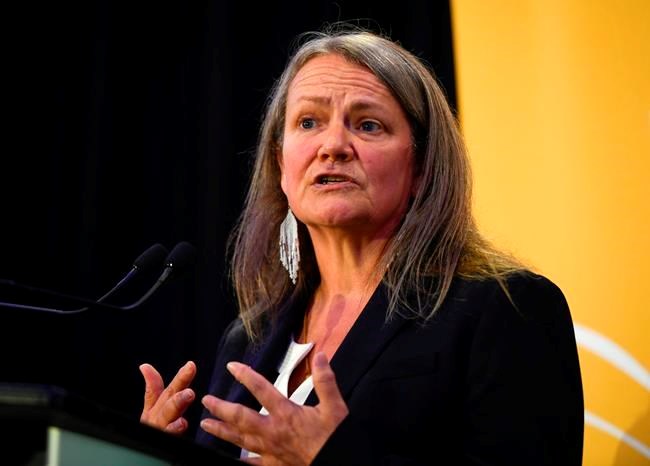VANCOUVER — The fight is not over to find records that could answer "hard questions" about unmarked graves at Canada's residential schools, including who the missing children were and how they died, said the woman appointed to work with Indigenous communities in searches underway across the country.
The Canadian government and the religious groups that signed the 2006 Indian Residential Schools Settlement Agreement following a landmark class-action lawsuit were required to provide their records to the Truth and Reconciliation Commission, but many are still missing, special interlocutor Kimberly Murray said.
While most of those documents are held by Catholic entities, Murray said she has personal experience finding additional records that hadn't been shared after Anglican officials in Canada indicated everything had been turned over.
She said she travelled with survivors of the Mohawk Institute in Brantford, Ont., to an Anglican diocese, where they found several boxes of files.
"That's just one diocese, and there are others across the country," Murray said in an interview on Tuesday.
"So, when the head of the church says, 'We gave everything,' and then we find out, well, that's not actually true over here, so how can we know it's true over there?"
The records are important because they represent "a path to the truth," said Murray, who is a member of Kanesatake Mohawk Nation.
Meanwhile, many other record-holding bodies, such as provincial archives, museums, universities and police departments, had no legal responsibility under the settlement agreement to share their files with the commission, she said.
Communities are going directly to those sources, trying to negotiate access to files that remain restricted, said Murray, noting police records could include information from calls to investigate abuses or locate children who fled the institutions.
Prime Minister Justin Trudeau has said his government is committed to sharing all the information it can possibly find about the institutions in federal records.
Without records documenting the genocide of Indigenous Peoples, Murray said, "deniers will continue to deny" and future generations could be led to forget.
Survivors of the residential institutions have a "right to know," Murray told a national gathering on unmarked burials in Vancouver.
That right is not only individual, but collective, so the country can "draw on the past to prevent future violations," said Murray.
Obtaining missing records "isn't an academic exercise," she said.
The records affect real people who are searching for information about their grandparents, their parents and their children, Murray said.
"These records can no longer be kept in vaults with colonial institutions controlling who sees them."
The renewed call for records comes amid a wave of searches at the sites of numerous former residential institutions across the country following the Tk’emlups te Secwepemc announcement in May 2021 that more than 200 suspected unmarked graves had been identified on the grounds of the former school in Kamloops, B.C.
A war graves expert had used ground-penetrating radar to detect the areas believed to hold the remains of children who died there.
A month later, Cowessess First Nation in Saskatchewan announced as many as 751 unmarked graves had been found near the former Marieval Indian Residential School, followed by similar findings at former institutions in several provinces.
On Tuesday, the Wauzhushk Onigum Nation in northern Ontario said it had uncovered 171 "plausible burials'' in studies of cemetery grounds at a former residential school site.
Rosanne Casimir, the Tk'emlups te Secwepemc chief, said the announcement in her community was like "ripping a Band-Aid off an old wound."
"So many people have been triggered, re-traumatized," said Casimir, who attended the national gathering on Tuesday.
She said she understands many records related to the institution in Kamloops have been turned over to the National Centre for Truth and Reconciliation, yet challenges persist with how that information is shared with community members.
"What's missing is the survivors today and their truth, their history as part of what really happened," she said.
That's why Indigenous sovereignty or control over how residential school records are accessed and used is so important, Casimir said.
Her community is working with a researcher and the Truth and Reconciliation Commission to compile the information needed for their investigation, she added.
Murray also told the crowd the Truth and Reconciliation Commission has said the most serious gap in knowledge stems from the incompleteness of records.
Many documents from past decades no longer exist, including "200,000 Indian Affairs files" that were destroyed between 1936 and 1994, she said.
Federal policy in 1935 allowed school returns to be destroyed after five years, while reports of accidents could be destroyed after a decade, she said.
It's also become clear that "many, many, many deaths were not reported" to the former Indian Affairs Department, Murray said.
While records are crucial, Murray added "there is nothing more powerful than the first-hand accounts from the survivors" of residential institutions.
"They are the witnesses themselves."
A 4,000-page report released by the National Truth and Reconciliation Commission in 2015 detailed harsh mistreatment at the schools, including emotional, physical and sexual abuse of children, and at least 4,100 deaths at the institutions.
Murray said the number of children who died will likely never be known in full.
This report by The Canadian Press was first published Jan. 17, 2023.
Brenna Owen, The Canadian Press




